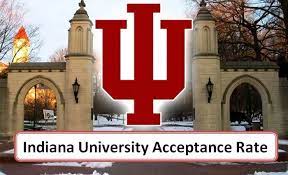The Mystery: Indiana University Acceptance Rate Revealed
When it comes to college admissions, acceptance rates play a crucial role in the decision-making process for prospective students. In this article, we will delve into the acceptance rate of Indiana University, a renowned institution known for its commitment to academic excellence and student success.
Indiana University

Indiana University, founded in 1820, has a rich history and is one of the leading public research universities in the United States. With campuses located in Bloomington, Indianapolis, Kokomo, Gary, New Albany, Richmond, and South Bend, Indiana University offers a wide range of programs and degrees across various fields of study.
The university prides itself on its dedication to academic excellence, fostering a vibrant learning environment, and promoting student success. Indiana University is home to renowned faculty members and provides students with numerous opportunities for research, internships, and experiential learning.
Demystifying Acceptance Rates
Acceptance rates refer to the percentage of applicants who are admitted to a particular college or university. They are an important factor for prospective students as they provide insights into the competitiveness of the admissions process and the likelihood of being accepted.
Understanding acceptance rates is crucial in the context of college admissions because it helps prospective students gauge their chances of admission and make informed decisions about where to apply. It is important to note that acceptance rates should not be confused with admission standards, which encompass a broader range of factors considered during the application review process.
Factors Affecting Indiana University Acceptance Rate
Indiana University considers various factors when determining its acceptance rate. While admission standards may vary for different programs and campuses, some common factors influence the overall acceptance rate:
Academic Requirements and Standards for Admission
Indiana University places a strong emphasis on academic achievement. Prospective students are expected to meet certain GPA and standardized test score requirements. While these requirements may vary depending on the program and campus, a competitive GPA and strong test scores are generally expected.
Extracurricular Activities, Essays, and Recommendation Letters
Indiana University values a well-rounded student profile. In addition to academic achievements, the university considers extracurricular activities, essays, and recommendation letters. These factors provide insights into a student’s interests, passions, and potential for contributing to the university community.
Geographical Diversity and Demographics
Indiana University strives to create a diverse and inclusive student body. The university considers geographical diversity and demographics when reviewing applications. This ensures that students from various backgrounds and regions have the opportunity to contribute to the university’s vibrant community.
Analyzing Indiana University’s Acceptance Rate Trends
To gain a better understanding of Indiana University’s acceptance rate, it is important to examine its historical trends. While acceptance rates can fluctuate from year to year, analyzing the trends can provide valuable insights. Here is an overview of Indiana University’s acceptance rate trends:
Historical Overview
Over the years, Indiana University’s acceptance rate has shown a gradual decline. This indicates an increase in the competitiveness of the admissions process. However, it is important to note that Indiana University continues to attract a large number of applicants due to its strong academic reputation and diverse range of programs.
Recent Acceptance Rate Trends
In recent years, Indiana University’s acceptance rate has remained relatively stable. While it may vary slightly between campuses and programs, the overall acceptance rate hovers around a certain range. Prospective students should refer to the university’s official website for the most up-to-date acceptance rate information.
Comparison with Peer Institutions
When comparing Indiana University’s acceptance rate with its peer institutions, it is important to consider factors such as academic reputation, program offerings, and geographical location. While acceptance rates can provide insights, they should not be the sole determining factor in choosing a college or university. Each institution has its unique strengths and opportunities for students.
Conclusion
As we conclude our exploration of the Indiana University acceptance rate, you are now equipped with essential knowledge to navigate your journey toward this prestigious institution. Summarize the critical points discussed in the article, emphasizing the importance of understanding the acceptance rate. Encourage readers to take action or seek more information regarding their specific circumstances.



